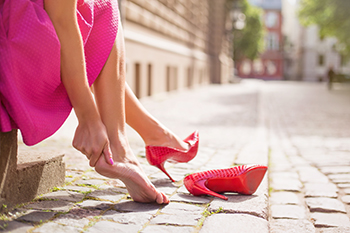
Heel height, heel base, and insole design significantly influence foot health and comfort. High heels can cause undue pressure on the ball of the foot, leading to pain, calluses, and even long-term deformities like bunions or hammertoes. Lower heels, those under two inches, are generally safer, reducing stress on the arch and heel. A wide, stable heel base offers better balance and reduces the risk of ankle sprains, especially in uneven terrain or prolonged standing situations. Narrow heels, like stilettos, increase instability and strain the foot muscles. Insoles play an important role by providing cushioning, arch support, and shock absorption, which are essential for minimizing discomfort and preventing injuries. Orthotic insoles can address specific issues like plantar fasciitis or flat feet. For personalized advice on footwear that supports your unique needs, it is suggested that you consult a podiatrist to ensure optimal foot health.
High heels have a history of causing foot and ankle problems. If you have any concerns about your feet or ankles, contact one of our podiatrists from Summit Podiatry. Our doctors can provide the care you need to keep you pain-free and on your feet.
Effects of High Heels on the Feet
High heels are popular shoes among women because of their many styles and societal appeal. Despite this, high heels can still cause many health problems if worn too frequently.
Which Parts of My Body Will Be Affected by High Heels?
- Ankle Joints
- Achilles Tendon – May shorten and stiffen with prolonged wear
- Balls of the Feet
- Knees – Heels cause the knees to bend constantly, creating stress on them
- Back – They decrease the spine’s ability to absorb shock, which may lead to back pain. The vertebrae of the lower back may compress.
What Kinds of Foot Problems Can Develop from Wearing High Heels?
- Corns
- Calluses
- Hammertoe
- Bunions
- Morton’s Neuroma
- Plantar Fasciitis
How Can I Still Wear High Heels and Maintain Foot Health?
If you want to wear high heeled shoes, make sure that you are not wearing them every day, as this will help prevent long term physical problems. Try wearing thicker heels as opposed to stilettos to distribute weight more evenly across the feet. Always make sure you are wearing the proper shoes for the right occasion, such as sneakers for exercising. If you walk to work, try carrying your heels with you and changing into them once you arrive at work. Adding inserts to your heels can help cushion your feet and absorb shock. Full foot inserts or metatarsal pads are available.
If you have any questions please feel free to contact one of our offices located in Wilmington, Whiteville, and Wallace, NC . We offer the newest diagnostic and treatment technologies for all your foot and ankle needs.
